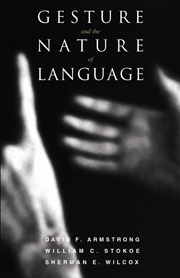Book contents
- Frontmatter
- Contents
- Acknowledgments
- Introduction: language from the body
- 1 The universe of gesture
- 2 The nature of gesture
- 3 Are signed and spoken languages differently organized?
- 4 Is language modular?
- 5 Do we have a genetically programmed drive to acquire language?
- 6 Language from the body politic
- 7 The origin of syntax: gesture as name and relation
- 8 Language from the body: an evolutionary perspective
- References
- Author index
- Subject index
Introduction: language from the body
Published online by Cambridge University Press: 05 June 2012
- Frontmatter
- Contents
- Acknowledgments
- Introduction: language from the body
- 1 The universe of gesture
- 2 The nature of gesture
- 3 Are signed and spoken languages differently organized?
- 4 Is language modular?
- 5 Do we have a genetically programmed drive to acquire language?
- 6 Language from the body politic
- 7 The origin of syntax: gesture as name and relation
- 8 Language from the body: an evolutionary perspective
- References
- Author index
- Subject index
Summary
A curious thing about the ontological problem is its simplicity. It can be put in three Anglo-Saxon monosyllables: “What is there?” It can be answered, moreover, in a word – “Everything” – and everyone will accept this answer as true. However, this is merely to say that there is what there is. There remains room for disagreement over cases; and so the issue has stayed alive down the centuries.
Willard Van Orman Quine, From a logical point of viewLanguage, like the physical universe, in all likelihood cannot be known fully by an observer in one place at one time. Language theorists and linguists, like physicists, must acknowledge uncertainty. In a masterful summing up of his philosophy of language and much else, Kenneth L. Pike (1993) explains how, as long ago as 1959, he wrote of “Language as Particle, Wave, and Field,” borrowing this three-part label for the principle of complementarity from the work of physicist Niels Bohr.
Complementarity and uncertainty go together: it is only by understanding the limitations on a single point of view or system of mathematics that one can begin to see further. Since Heisenberg, physicists have known that if one can locate a particle precisely, its action (as part of a wave of similar particles) will escape detection, and that if one studies the wave action, individual particles disappear. Field theory states the necessity of looking at both wave and particle.
- Type
- Chapter
- Information
- Gesture and the Nature of Language , pp. 1 - 4Publisher: Cambridge University PressPrint publication year: 1995



